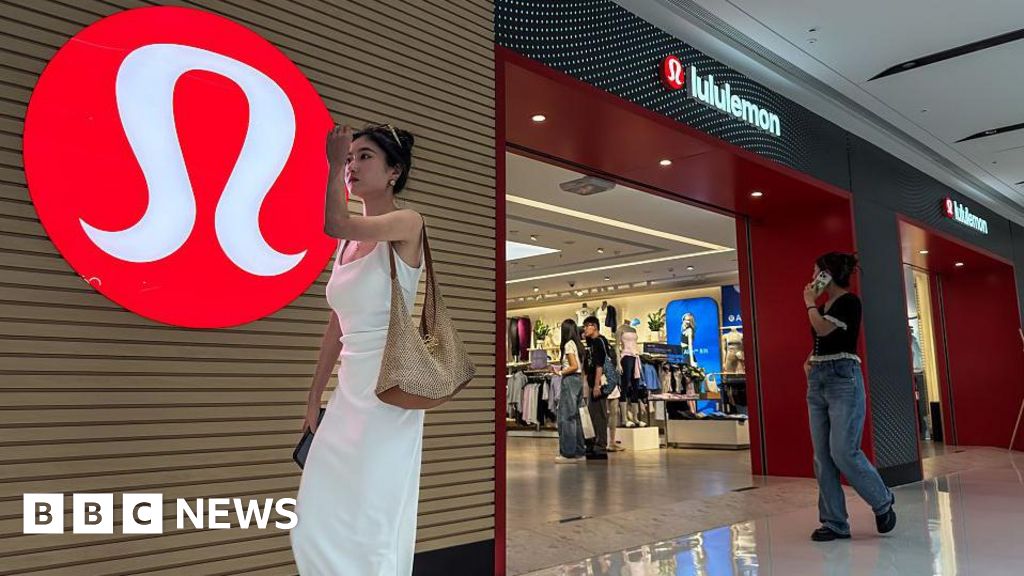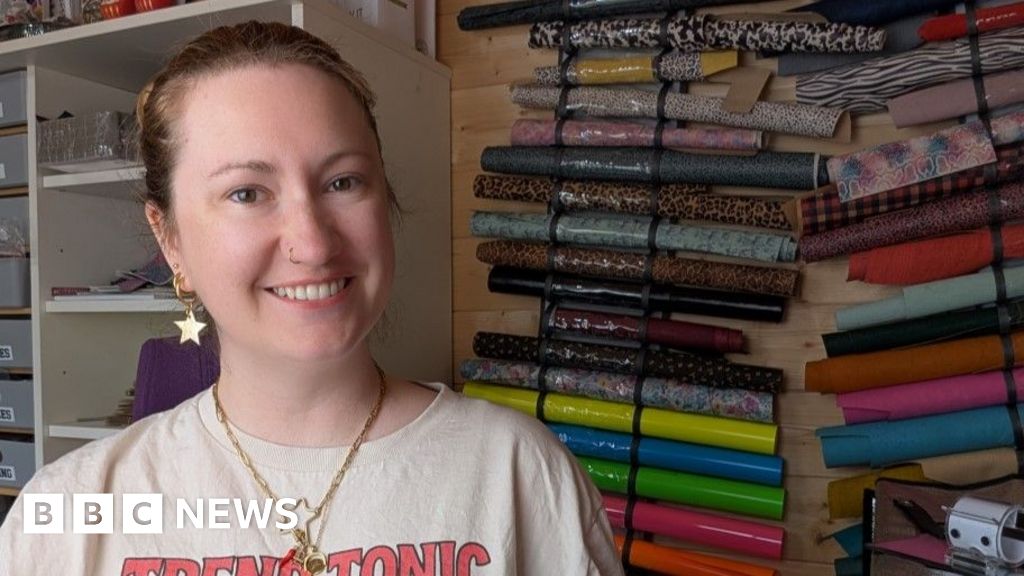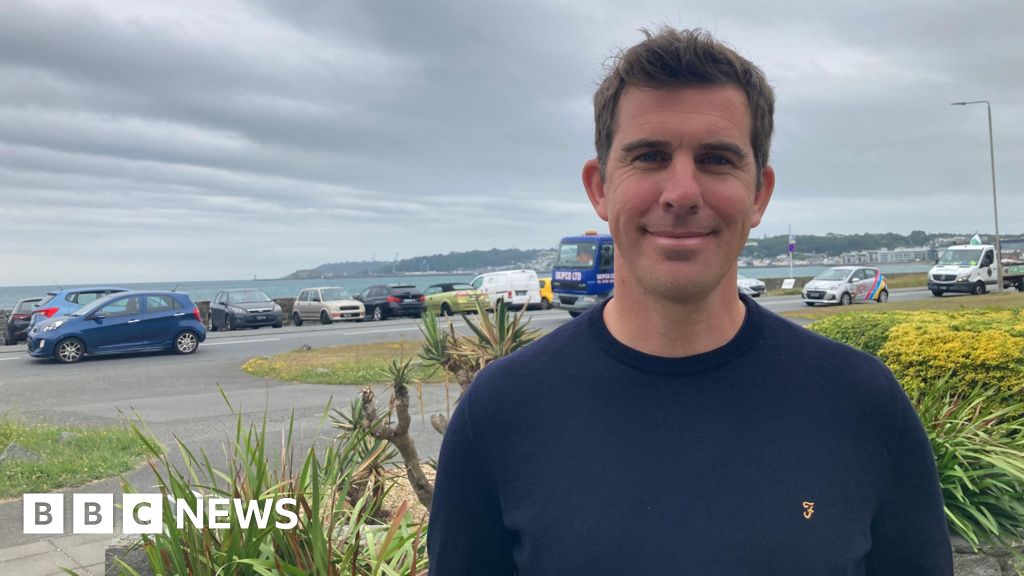ARTICLE AD BOX
By Katherine Latham
Business reporter
Image source, Homegrown Homespun
Image caption, Fashion designer Patrick Grant has helped to lead the project to grow flax in Blackburn and turn it into linenBack in April a team of around 30 volunteers started work on a grand plan - to grow their own clothes.
On a patch of unused land in the Lancashire town of Blackburn, they planted the seeds of two crops - flax and woad.
Fast-forward to early August and they harvested the small field beside the Leeds & Liverpool Canal.
The flax has since been broken, scutched, hackled, spun, and woven to create the fabric linen.
Meanwhile, the woad leaves were heated and then cooled in water to create natural indigo dye to colour the linen blue.
Image source, Homegrown Homespun
Image caption, The flax was harvested in AugustThis Saturday, a portion of the linen will go on display at Blackburn Museum and Art Gallery.
This is taking place as part of the month-long British Textile Biennial 2021 festival of UK fabric and clothing production, being held at 13 venues across east Lancashire.
The flax and woad were grown and turned into linen and dye by a fashion collaborative called Homegrown Homespun.
This compromises Community Clothing, a fashion company and social enterprise that does all its manufacturing in the UK; North West England Fibreshed, an association of textile professionals; and The Super Slow Way, the organisers of the aforementioned textile festival.
Blackburn, Manchester, and Lancashire in general were once at the centre of global textile manufacturing. But after World War Two the industry went into sharp decline, as production shifted overseas to countries with cheaper manufacturing set-ups.
Image source, Kirsty McDougall
Image caption, A portion of Homegrown Homespun's first linen, pictured, will be turned into dungarees this weekendHomegrown Homespun hopes to help review Blackburn's textile industry, by producing linen clothes locally - from growing the flax to making the garments.
"The idea with Homegrown Homespun is the rebuild the entire supply chain," says Patrick Grant, fashion designer and founder of Community Clothing who is also a judge on the long-running BBC TV show Great British Sewing Bee.
"In this country we used to be completely self-sufficient in clothing. Most clothes were linen or wool, and flax was grown all across the UK. "In fact, in the 16th Century, it was law that every landowner had to dedicate a portion of their land to growing flax."
Flax is sometimes called "Britain's forgotten crop". It is considered to have first been cultivated in the British Isles for the production of linen during the Bronze Age - some 4,000 years ago.
By the 18th Century around 50 million yards of linen was produced in the UK, but during the 19th Century it was replaced by imported cotton, and linen production fell away.
Flax is still grown commercially in the UK to produce linseeds, which you can eat, and linseed oil, which is used as a wood treatment and in paint. However, flax hasn't been grown commercially for the plant's fibre since the 1950s.
"We want to see if it's possible to rebuild the UK flax and linen industry," says Mr Grant.
"So, we can have locally-grown fibre going into our clothes for the first time in a long time. We want to demonstrate that flax can be grown viably, for linen, in the UK."
Image source, Getty Images
Image caption, Flax plants have blue flowersJustine Aldersey-Williams, founder of North West England Fibreshed, says that flax is a good crop to grow in the UK because it is so hardy - it doesn't require watering, pesticides or fertiliser.
The only downside, she says, is that it is labour intensive to harvest and process into linen, making it more expensive than imported cotton.
"There are no mechanised flax processing facilities in the UK, so we're learning from our pre-industrial ancestors and doing everything by hand," she says.
Despite this handmade scale at present, Mr Grant adds: "More and more consumers are buying linen because of its environmental benefits. They know it's good for the planet."
Growing more flax in the UK to make British-made linen clothing would also cut down on the carbon emissions, and cost, of shipping and flying fabric and finished garments into the country.
There is one clothing fabric that the UK is not short of - sheep's wool.
Babs Behan runs Bristol Cloth Project, which sells scarves, cloth and knitting yarn made from wool sourced from farms within 15 miles of the city. She and her team colour the wool with dyes made from plants foraged locally.
Image source, Kasia Kiliszek
Image caption, Bristol Cloth Project uses local wool to make its scarves, pictured here being worn by a model"It's simple," she says. "We need to make less, make it well, and make it last. We must make sure the things we bring into our lives - and wardrobes - are appreciated, looked after, and go back into the soil as food, not poison."
Oxfordshire-based fashion designer, Justine Tabak, also uses a lot of UK wool, specifically from Yorkshire sheep, at her eponymous clothing company.
In addition, she buys Irish-made linen, cotton lace woven in Nottingham, and also uses "deadstock fabric" - discarded ends of rolls from other manufacturers and designers.
"It goes some way to limiting over-consumption," she says. "My clothes aren't cheap, but I know that my customers wear [them] time and time again over many years, meaning price-per-wear is low."
Image source, Justine Tabak
Image caption, Designer Justine Tabak and her daughter Daisy model clothing she made from fabric that may otherwise have been wastedAlmost half of UK consumers are now consciously buying locally-produced goods to try to be more sustainable, a report by accountancy group Deloitte found earlier this year.
This tallies with what Kate Hills has seen at her organisation Made It British, which promotes UK brands, and helps businesses get their products manufactured in the UK.
"The majority of our members recorded their best year ever in 2020 [despite the pandemic]," she says. "People were looking for something that wasn't made in China.
"[And] when you're flying products all around the world you're making a big carbon footprint."
New Economy is a new series exploring how businesses, trade, economies and working life are changing fast.
Back in Blackburn, Homegrown Homespun aims to scale-up to commercial production by 2023.
This year they harvested enough flax to make samples of linen, but Mr Grant says there are lots of other plots of disused land in Blackburn that they plan to plant on.
"We want to create and sustain jobs in the areas [like Blackburn] that really need them," he says. "[And] we want to show that there is a better way to produce clothing."

 3 years ago
57
3 years ago
57








 English (US) ·
English (US) ·